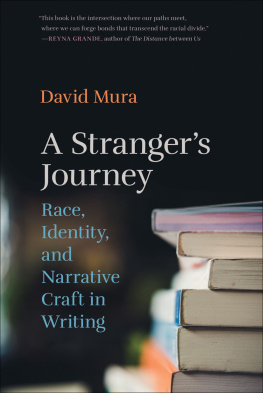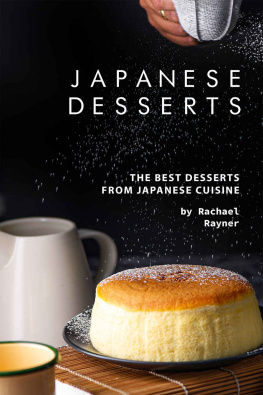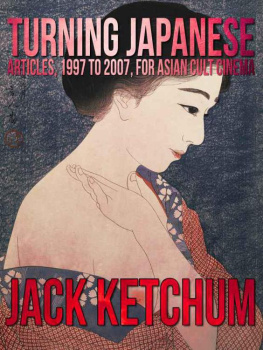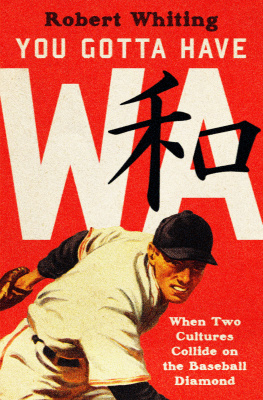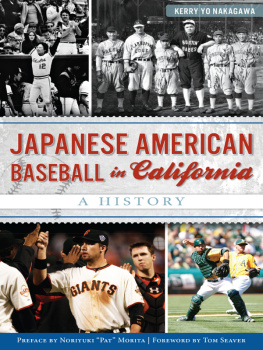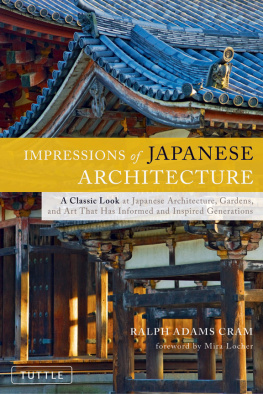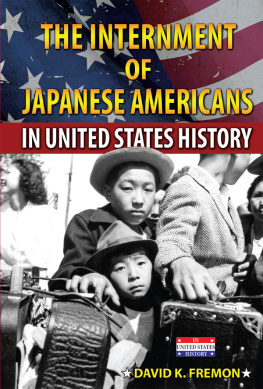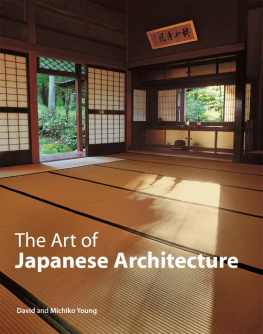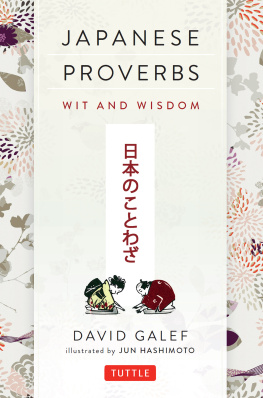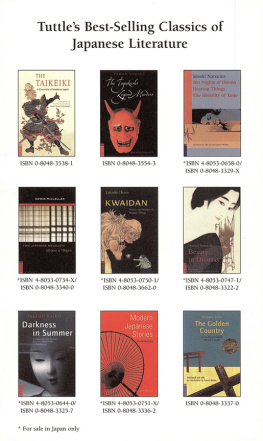Praise for Turning Japanese:
Turning Japanese is an important contribution to our knowledge of Japan and an engaging memoir in which Mura writes candidly of his life, his passions and his desire to find clarity in his ancestral land. He tells of battles with his father that go to the heart of the conflict between an older generation desperate to assimilate and a younger generation anxious to discover itself.... The stories he tellsabout a political demonstration, learning to dance, a night of drinking with Japanese friendsare vivid and revealing.
Michael Shapiro, Newsday (New York)
Turning Japanese reads like a fascinating novel you cant put down.... The strength and eloquence of Muras book resides in his ability to capture and speak to the Japanese-American experience across generations, and perhaps, more important, to present the tools and insights for people across cultures and ethnicities to examine, reexamine and reclaim their sense of history and identity. In this way, Muras story is a universal one, and one that is accessible to everyone, even those whose experience in the United States is not that of a person of color.
Sheila Muto, AsianWeek
In his memoir Turning Japanese, the poet David Mura brings an intriguing perspective to the New World quest for enlightenment from this ancient and ascendant culture, being himself a sanseia third-generation Japanese-American.... Drawing on his own history of repressed racial self-consciousness, Mura is quite good on the sexual politics of race.... His general observations on the landscape and customs can be fresh and revealing.... Ultimately, Mura seems to have acquired a sense of ease, and of inspirationlike a man who has discovered a fertile atoll in the mid-Pacific.
Jay McInerney, The New York Times
Compulsively readable.
Ken Mochizuki, Northwest Nikkei
[Mura] paints a portrait of Japan that is rich and satisfying... a refreshingly kindly and tolerant study, a powerful antidote to the venomous anti-Japanese mood that seems, distressingly, to be seizing some corners of the American mind.
Simon Winchester, Cond Nasi Traveler
A dizzying interior voyage of self-discovery and splintered identity... his detailed examination of the shifting, nonunitary, infinitely adaptable Japanese selfmore concerned with the roles it plays than with essence or individualityprobably defines for us a future mode of personal existence on an increasingly crowded planet.
Joseph Coates, Chicago Tribune
This intimate memoir of a third-generation Japanese-Americans foray into the land of his ancestors is more than a colorful travel journal. And it is more than the story of one mans search for his cultural place in the world when for the first time he is surrounded by faces all looking like his. Poet David Mura has made his first book something rarera brutally honest, beautifully written meditation on art, race, country, sexuality, and marriage, and ultimately on his longest journey, the exploration of himself as a man.... This book is the powerful record of all he saw and experienced [in Japan], written with a poets eye and a memory for what was never there.
Joyce Howe, East Bay Express (Berkeley)
Turning Japanese is an honest, thought-provoking portrait of a young man who happens to be a very interesting fellow. He has somehow absorbed the experience of three generations of Japanese-Americans, and, as this book shows, made it his own. He returns to the land of his ancestors in search of a lost center within his soul and describes all this with a poets sensibility and an unfailing eye for irony.... It is a fine work.
Kunio Francis Tanabe, The Washington Post
Turning Japanese is a sensitive meditation on the experience [of Japan].... Mura never manages to package his tangled reactions as neatly as some readers might hope. But his world has clearly widened, and his honest probing of self and society makes enticing reading.
S. Keith Graham, The Atlanta Journal-Constitution
Stories and books about individuals returning to the land of their ancestors are quite common and almost routine. But David Muras book, Turning Japanese, manages to stand out in the crowd. In the end it is the fundamental honesty of Mura that makes his autobiographical work on his visit to Japan so compelling.... Books like these are important because they open doors, start new discussions, bring about fresh air in what has been a locked-room subject.... Any Sansei who has visited Japan will relate to the subject matter and any person of color who has looked in a mirror and wondered why he didnt fit in with the majority in America will want to read this work for its insight.
Chris Komai, Rafu Shimpo: The Los Angeles Japanese Daily
On its surface Turning Japanese is a memoir of a year [Mura] and his wife Susie spent in Tokyo on a creative artist exchange fellowship. After reading a few pages one comes to see that Muras narrative is of richer material. Woven tightly in with a poets vivid impressions of a stunningly modern Japan are threads of the sansei experience, both collective and intimate. The book is really an admirably frank account of a sanseis efforts at forging a viable identity, a definition, not only for himself but, ineluctably, for an entire lost generation of Japanese Americans.
H. Y. Nahm, Transpacific
In reading Turning Japanese, one sees David Mura embark on a journey, unveiling many subtle and important revelations about his own cultural identity and what his one year in Japan allowed him to discover.... [The book] is quickly paced and always compelling. Part IV, concerning a visit from Muras parents from the United States is especially moving.... In the first memoir by a Japanese American of this generation, Mura has provoked and addressed some hard questions about turning Japanese.Sharon Hashimoto, International Examiner
Born in Chicago, raised as a provincial Midwesterner, Mura takes us on a sometimes dreamlike journey through the land of the Rising Sun a land thats as foreign to him as to most non-Asians.... Slowly Mura confronts his internalized racism and grows angry toward the American melting pot that boils away any other culture than its own. Not only does Mura uncover what it means to be Japanese, but what makes an American.
Ellen Krout-Hasegawa, Los Angeles Weekly
Muras intelligent and well-written account of his experiences reveals that a hyphenated American, however alienated from the mainstream culture, is an American still.
Charles Soloman, Los Angeles Times
The heady drafts of this book are indeed his tale-spinnings and meditations, and there is genius in the divagations of his thoughts as they drift toward contemplations of the past, to ramblings on literary histories, both Japanese and Western, to questions of personal identity and his relationship to white America.... Like Petrarch, he writes with grace and simplicity of style; like Augustines, his imagination is capable of sustained rococo meditation; like Sei Shonagon, he is possessed of a finely tuned wit. Yet, it is his confrontation of painful, personal and racial conflicts that makes this work unique and inspires his most compelling writing.... Muras book is a saga from a postexistentialist perspective that might serve as a contemporary guide to perplexed world travelers and displaced persons who have not so much lost secure identities and homelands as the abiding needperhaps classical and outmodedto maintain them.... His Turning Japanese is an extraordinary contribution and a necessary book for our richly complicated time.
Garrett Hongo, Manoa
[Muras] engrossing memoir includes piquant descriptions of Japanese life.... His discoveries also lead him to reflect on his childhood, issues of assimilation and racism, his relationship with his white wife, and the dark, raging side of sexuality. An eloquent account of a catharsis that illuminates both personal and societal aspects.
Next page

